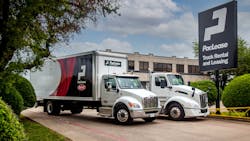Semiconductors have become the national poster child for commercial vehicle equipment shortages. However, there are many other material shortages playing a role as well—anything petroleum- or resin-based, aluminum, copper, and rubber, for example.
When it comes to procuring equipment to move a record amount of freight, the commercial vehicle industry is coming down from pandemic-induced capacity and labor delays in late 2020 and being met with persistent supply chain challenges that ramped up in 2021.
Kyle Treadway, dealer principal for Kenworth Sales, explained that it’s been a moving, shifting situation.
“I can tell you that for the last year, it has felt like whack-a-mole,” Treadway told FleetOwner. “Every time we seem to narrow down and improve a situation, another problem crops up, and that is still the case today."
Treadway noted that there are a number of measures Kenworth dealers have taken themselves, as well as in cooperation with suppliers, to keep vehicles up and running. That has meant beefing up inventories and ramping up communication with fleet customers and suppliers to let them know the status of replacement parts and components.
“We had all worked ourselves into a just-in-time mode a couple of years ago, and that has just positioned us to be vulnerable,” Treadway said. “We’re improving the stocking quantities that we have by using dealer management software to help us try and manage the different seasonality and cycles so we can accommodate longer lead times in ordering supplies.”
In October 2021, everything turned on a dime, Treadway pointed out.
“Our entire order board was canceled, and we had to go to our customers and say, ‘Force majeure—that contract that we had with you is no longer any good; we have to resubmit. You may not get the model you want, the spec you want, the engine you want. You may not get it when you want it, and you certainly aren’t going to get it for the price we previously agreed to,’” he said.
For Treadway, that’s when relationships with the OEM, supplier, and fleets became more important than ever.
“You have to have built a history with all of those stakeholders so that they understand the message you’re delivering and the context in which it’s made,” Treadway advised. “You also have to keep in mind that you want to do business with your customer five years from now, so you want to do whatever it takes to maintain that relationship.”
Jetco Delivery, which provides intermodal, open deck, heavy haul, dry van, asset-backed freight brokerage, and warehousing services, hasn’t necessarily had trouble procuring equipment; the difficulty has been long lead times. Companywide, Jetco and its parent company, GTI Group, run about 140 trucks—mostly Freightliners in the Houston market and Peterbilts in Canada.
